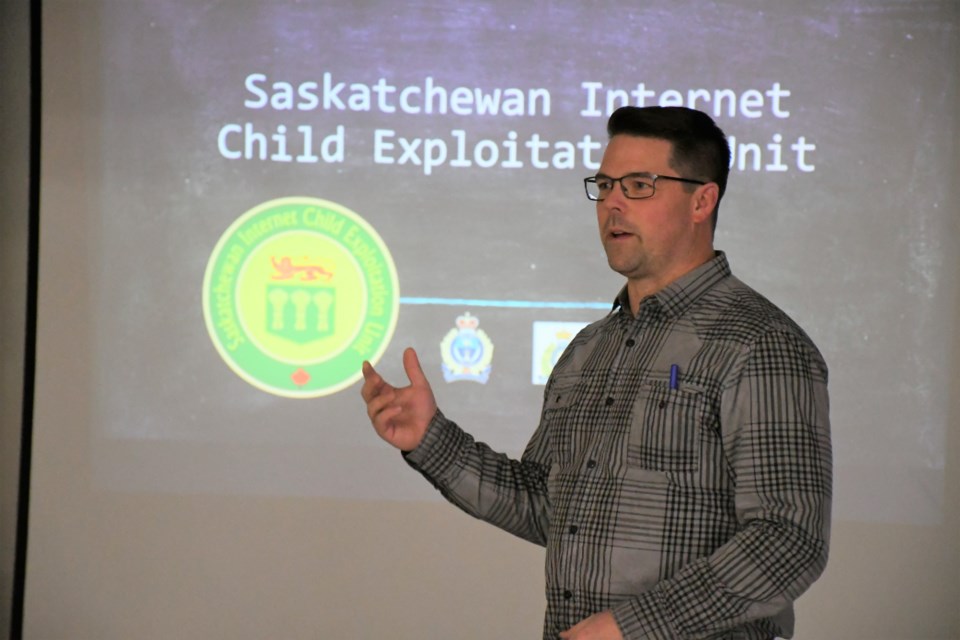The internet has made exploiting and abusing children easier than ever, but two officers with the Moose Jaw Police Service have dedicated themselves to stopping this heinous crime.
Investigators Sheldon McNaughton and Josh McNaughton spoke to the Moose Jaw Board of Police Commissioners during its March 10 meeting about their work in this area.
Sheldon is an investigator and supervisor of the criminal investigation section, while Josh is an investigator. Both handle Moose Jaw-related files from the Saskatchewan Internet Child Exploitation (ICE) Unit and child abuse cases connected to The Friendly City.
Working together
The Saskatchewan ICE Unit is provincially funded and composed of officers from Regina, Saskatoon, Prince Albert and the RCMP, Sheldon said. While Moose Jaw is not officially a member nor has funded positions, the police service has successfully partnered with the organization.
“They are very excited to have us also do some work because whatever file we do here is one they don’t have to send an officer from another city,” he remarked. “Because of the nature of these investigations, they can be very technical and complicated. It makes more sense for them to be fully aware of every file that we’re doing here in Moose Jaw.”
Investigation data
Data shows that the number of files that Saskatchewan ICE has investigated over the past decade has ballooned. In 2012, ICE officers handled 186 files, charged 34 people, and laid 60 charges. In 2021, those numbers were 853, 37, and 97, respectively.
In particular, the number of files that ICE handled between 2018 and 2018 increased by 106 per cent.
File numbers are exploding because of the internet and the fact predators are finding new ways to cover their tracks, said Sheldon. There is also self-exploitation, where children — who are naïve — take pictures of themselves and post them on the web.
Unit’s mandate
ICE’s mandate is to investigate and reduce the sexual exploitation of children abused via the internet or social media, he explained. The unit aims to identify victimized children, assist the legal system in prosecuting offenders, provide public education to reduce victimization, and ensure a focus on crime reduction and prevention of “very serious crimes” against children.
There are two types of files that ICE officers investigate: reactive and proactive, Sheldon continued.
Reactive files are generated from outside sources such as Interpol, the Department of Homeland Security, the FBI, Cybertips, Crimestoppers or municipal police. Social media companies and service providers also flag issues and forward them if they are connected to Moose Jaw.
“That’s primarily what takes up most of our time, is responding to those files,” Sheldon said, who noted one image can lead to a whole cache of other images. “By the time we get the complaint to the time we maybe get a suspect can take up to a year … .”
Meanwhile, proactive files are files that investigators generate via research, such as peer-to-peer file-sharing, online personals, social media forums, and chat rooms. Officers can also pose as children or individuals who target kids and attempt to lure or meet them.
While these offences are “horrible and disgusting,” predators are not satisfied with just images but want to touch children physically as well, he continued. Therefore, these investigations also find child molesters, hold them accountable, and save victims.
Partnerships
“The co-operation on this (from) city to city, province to province and country to country is unbelievable,” said Sheldon.
During one investigation, the Regina ICE unit acquired pictures via file-sharing. The unit then contacted the Moose Jaw unit, which contacted the service provider, acquired a warrant, and arrested the man.
However, officers discovered that the man’s granddaughter had been staying with him for the past six summers and had shared a bed with him, which alarmed investigators, Sheldon said. Eventually, the girl disclosed that her grandfather had abused her when she was there.
Sheldon added that while he and Josh are ICE investigators, they also handle investigations into child abuse.
Child abuse
Josh explained that he primarily handled child abuse investigations during the last two years before joining Moose Jaw’s ICE unit a few months ago. He noted that child abuse investigations are time-consuming but timely since someone usually has disclosed something to someone else.
The police service works with the Ministry of Social Services on such cases, including going with ministry officials to a school or home to talk to kids and, if necessary, remove them, he continued. Through investigations, police determine that some incidents seem awful but end up being minor or can seem like nothing and turn into something severe.
“It’s an interesting world. I have sent files all over the world. I am currently talking to Interpol about a file that happened with a family when they were travelling to the Philippines … ,” added Josh. “It’s challenging work, but it’s the most rewarding work I’ve done as a police officer.”
The next Board of Police Commissioners meeting is Thursday, April 14.




